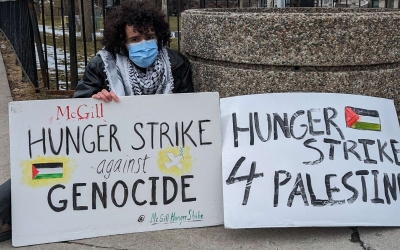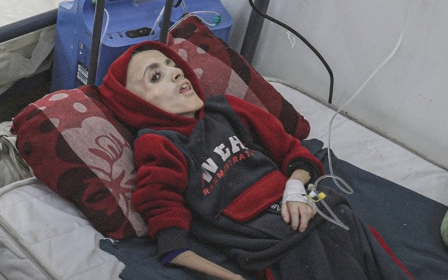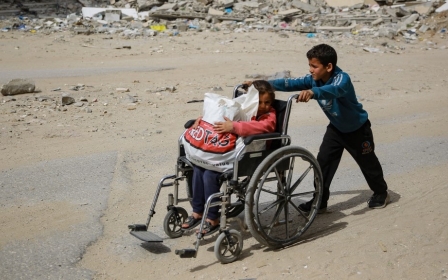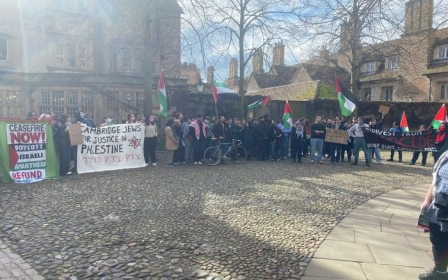War on Gaza: Yale students launch hunger strike to demand divestment from Israel's war
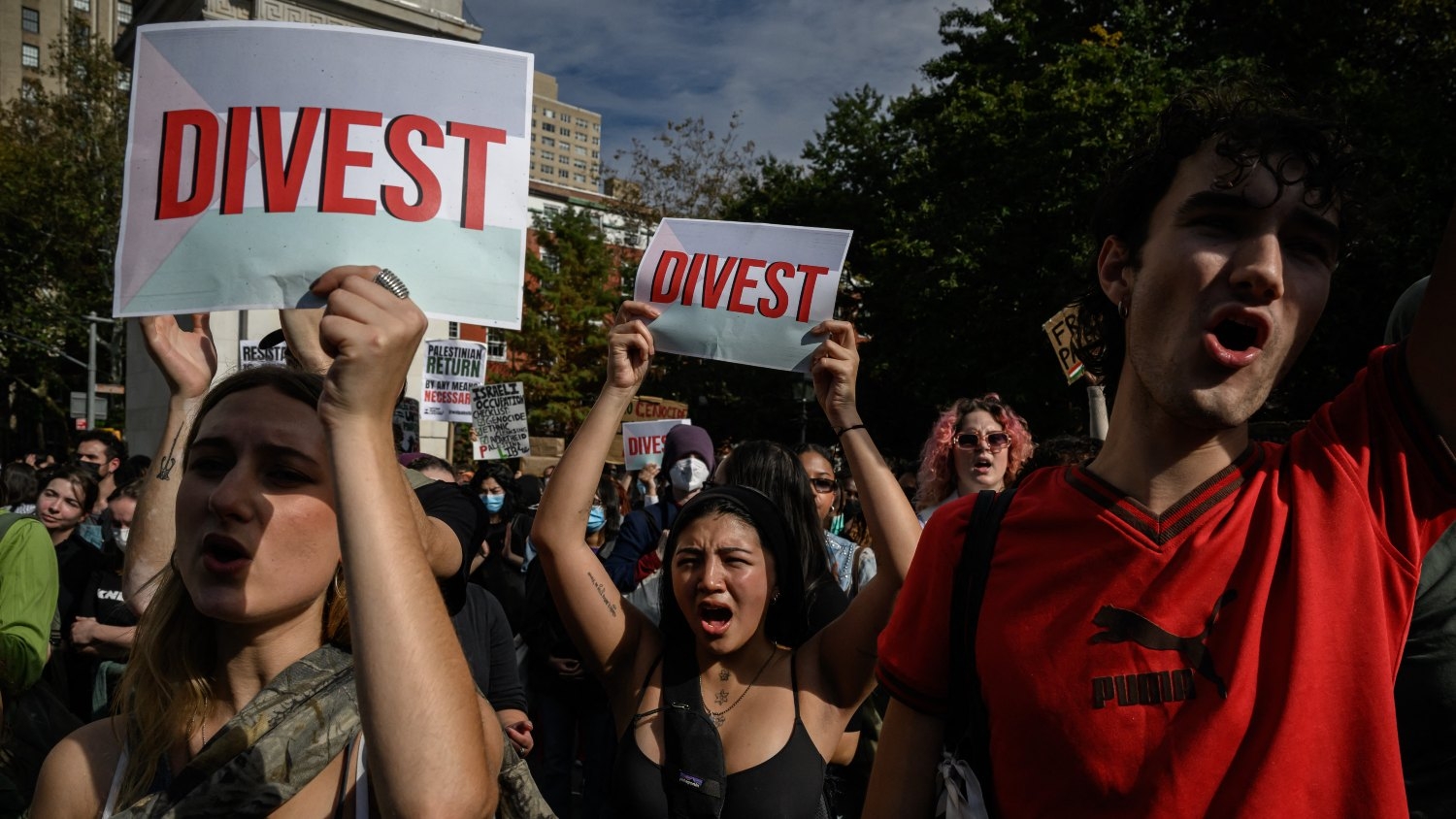
A group of graduate students at Yale University launched a hunger strike on Friday in protest against the institution's investments in companies providing Israel with military weaponry.
Students argue the university is profiting off of what a growing number of Americans say is a genocide of Palestinians in Gaza being carried out by Israel.
The hunger strike was launched after students with the group, Hunger Strikers for Palestine, sent a letter to Yale president Peter Salovey on Wednesday, demanding that the university divest from its investments in companies providing Israel with military technology.
"We demand that by the morning of this Friday, 4/12/2024, you make a public statement committing to divest from all weapons manufacturing companies contributing to Israel’s assault on Palestine," said the letter, which was shared with Middle East Eye.
"We demand that at next Saturday's Yale Corporation board meeting, you and the rest of the board discuss plans for divestment and release a public statement acknowledging that the board has done so."
New MEE newsletter: Jerusalem Dispatch
Sign up to get the latest insights and analysis on Israel-Palestine, alongside Turkey Unpacked and other MEE newsletters
That Friday deadline came and went without a response.
In a response to MEE's request for comment, Yale acknowledged receiving the letter and told MEE that the university is "steadfastly committed to free expression and the right to peaceful protest, values that are foundational to our academic community".
"University Staff have reached out to student organizers to provide them with resources," a university spokesperson told MEE.
"Staff members will continue to emphasize the importance of student health and well-being during this time. Students participating in a hunger strike are encouraged to consult with clinicians at Yale Health."
Yale University's Graduate Students for Palestine (GSP), which helped organise the letter and the hunger strike, said this protest is the result of the administration ignoring their protests and demands for months.
"This is the last thing folks are able to give, their bodies," a member of GSP, who spoke on condition of anonymity, told MEE.
"In the total nonresponse of any kind from the institution we are speaking to, the final thing we can put on the line really is our health and well-being."
The university told MEE that its Advisory Committee on Investor Responsibility (ACIR) was asked during a meeting last year to consider a policy of divesting from military weapons manufacturers.
"The ACIR has looked into the issue and is preparing to provide an update to the community in the coming weeks," the spokesperson said.
Cultivating silence
The war in Gaza began on 7 October, when Hamas and other Palestinian armed groups launched a surprise attack on southern Israel, killing 1,200 people and taking around 240 people hostage.
Israel responded to the attacks with a declaration of war, launching a siege on Gaza and a devastating aerial bombing campaign that was followed weeks later with a ground invasion of the Gaza Strip.
Israel's war on the enclave has killed more than 33,000 Palestinians, most of whom are women and children, levelled entire residential neighbourhoods, and targeted other civilian infrastructure including schools, hospitals, and mosques.
In January, South Africa took Israel to the International Court of Justice over accusations of conducting genocide in Gaza. The ICJ delivered an interim ruling calling on Israel to refrain from impeding the delivery of aid into Gaza and improve the humanitarian situation. UN special rapporteur Francesca Albanese also released a report saying there are reasonable grounds to say Israel is committing genocide there.
At universities across the US, Israel's war has led to a surge in pro-Palestinian activity, with campuses becoming spaces for demonstrations demanding an end to Israel's war, as well as an end to Israel's occupation of Gaza and the West Bank.
However, many of these protests have been met with a crackdown on the civic life of students and academics, with groups like Students for Justice in Palestine and Jewish Voice for Peace being banned by some universities.
At Yale, students say the months-long protests have been met with a "repressive silence".
"I would say that generally we are met with silence. Yale has cultivated an atmosphere of silencing, and in a way, hostility, because it would posit a position of neutrality or academic freedom and freedom of speech," a member of Graduate Students for Palestine (GSP) told MEE.
"However, this freedom of speech rarely protects Arab, Muslim, and Palestinian students."
In a press release shared with Middle East Eye, the group Hunger Strikers for Palestine says they have sent multiple letters to Yale, calling for the university to "divest from weapon manufacturing", beginning on 11 November 2023.
"Students have exhausted their means of communicating with the Yale administration about divesting from arms manufacturing," the press release said.
The GSP member said that as a result of the silence, the hunger strike is a last-ditch effort to get their voices heard.
"Our demand is divestment, and this is the most intense, and also a final way for us to ask Yale to hear our demands," the student said.
However, the hunger strike also plays an important role in the context of Gaza, where parts of the enclave are already experiencing famine. Dozens have died as a result of hunger and malnutrition.
"On another level, it's also to say that this would, no matter what, only be a fraction of the absolute devastation that Palestinians are going through," the student said.
"Being at the heart of empire, nothing we do would quite be enough, but this is the total solidarity that we hope to show."
'Power of collective action'
The students at Yale have pointed out a number of investments the university has made in companies that profit off of Israel's military.
In their letter, the students say that Yale has put more than $640,000 in Exchange-Traded Funds, meaning the institution indirectly has investments in weapons manufacturers like Lockheed Martin, Raytheon, Boeing, and Northrop Grumman, "which produce the bombs, planes, and weapons used to carry out Israel’s indiscriminate attacks on Gaza".
'In the shadow of this past month of Ramadan, for the students to take on a hunger strike is an extremely powerful gesture'
- Member of Yale's Faculty for Justice in Palestine
The hunger strike at Yale also comes amid a wave of other similar acts of protests at several universities in the US, which Yale students have looked to as a model for their actions.
Earlier this year, students at Brown University began a hunger strike with a similar demand for their institution to divest from companies that profit from Israeli human rights abuses against Palestinians.
Last month, a student at McGill University was hospitalised after launching an indefinite hunger strike in protest against the school's investments in similar companies.
"Student activism and student protests is a time honoured, in some sense, social and political tradition in the United States," a member of Yale's chapter of Faculty for Justice for Palestine told MEE.
"In the context and in the shadow of this past month of Ramadan, for the students to take on a hunger strike is an extremely powerful gesture. And for these students to do this in solidarity with other students on campuses, I think they are very aware of the power of collective action."
Middle East Eye delivers independent and unrivalled coverage and analysis of the Middle East, North Africa and beyond. To learn more about republishing this content and the associated fees, please fill out this form. More about MEE can be found here.


